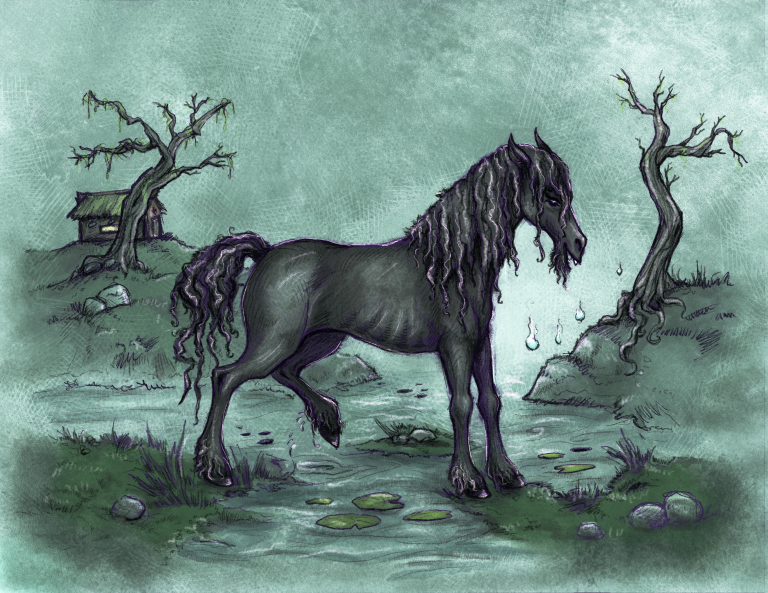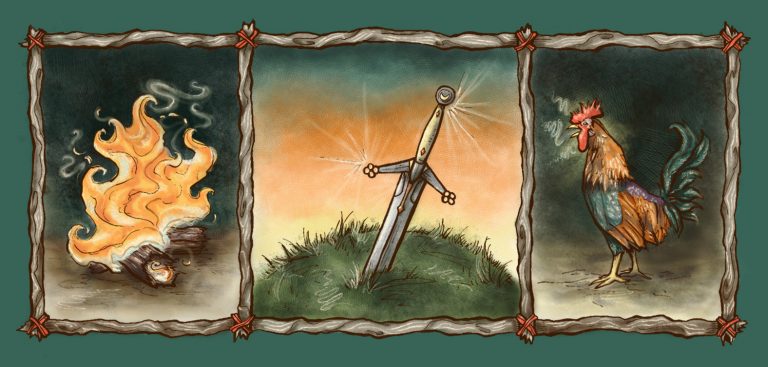The Two Sisters and the Curse

“Who does she fancy Limpet? Do I have a shot Limpet? Can you put in a word Limpet? Limpet? Limpet Ailsa!”
Finally, the girl snapped.

By Róisín McCrimmon
A few years ago, I went travelling through Mull. As I made my way round the island I saw a woman wandering the roads, singing a terribly mournful tune. Her clothes were ragged and speckled with mud, while her hair hung in thorny brown clumps.
Well, you know me, I was too curious to think about NOT finding out what she was doing. I followed her for two full days. She never stopped. Countless times I nearly lost her on the road, desperate to sit down and recover my breath; to eat; to drink; to stand by a warm hearth and feel my toes again! But she never stopped.
Finally, I had enough. I was nearly mad after two days of sore feet and the maddening mournful song she wouldn’t stop singing. I tried to grab her by her arm- I remember how she felt like stone: deathly cold and rigid. It was like grabbing a statue’s arm, and expecting it to hop down from its plinth. It was so long ago now, and I can’t remember if her eyes were blue, or brown, but I remember they gleamed with the cold fire of hatred. Her face was so twisted, so distorted with malice I nearly jumped out of my skin. The poor woman was obviously possessed by some kind of fairy – I know what I saw!
Anyways, at that point I was luckily close by to Dervaig, so I used the last of my strength to flee from the woman to the inn there. While I was recovering by the fire, I asked about the creature that had near frightened the life out of me. The barman there knew immediately what I had seen.
He told me of two sisters who had lived down in Lochbuie. The eldest was tall, and kind, and beautiful, and such a joy to have in the town they all knew her as Lovely Mairearad. The youngest was small, and kind, and was so devoted to her sister she followed her everywhere – so they all knew her as Limpet Ailsa, or just Limpet.
One day, one of the young lads came up to Ailsa. He heckled her, and prodded her, and generally bothered her as only a young lad can do, asking over and over again about Lovely Mairearad.
“Who does she fancy Limpet? Do I have a shot Limpet? Can you put in a word Limpet? Limpet? Limpet Ailsa!”
Finally, the girl snapped.
“My sister would never have one of you idiots! Don’t you know? She’s taken up with a fairy lover, who brings her the finest gifts, and is more handsome than any of you lot put together!”
Of course, that drew a great laugh from the crowd. Ailsa stared them down with a challenging gaze, breaking into a small, smug smile.
“Don’t believe me? Come along to our house tonight at dusk – you’ll believe me then!”
It wasn’t really unusual behaviour for Limpet Ailsa: she often proclaimed her sister was the most beautiful in the isles, in Scotland, even, and had caught the eye of selkies and kelpies and lairds and knights. She was just so proud of Lovely Mairearad, and was desperate to show her off. At the time, only the old grannies believed her and tried desperately to tell the others to keep away, to not listen to the foolish bragging of a young girl and tempt the ire of the sidthe. Maybe, if they had listened, there wouldn’t have been all this trouble.
But, the lads followed Ailsa down to the little cottage she shared with her sister, and maybe a few other folks came along too – there’s nothing like free entertainment, after all. And they were giggling and joking, excited to see Limpet all embarrassed –
Here, the barman looked at me seriously.
“I was there that night, you know”. He was polishing a glass at the bar, the bulbous shape distorting his face in the flickering light of the fire.
“I saw him. A fairy I mean. He appeared as if from nowhere, and though he looked like a man you could just tell that he wasn’t. It’s less about what he looked like, but I could swear, even the birds stopped singing, and the clouds stopped moving in the sky. It was like the world was frozen, waiting to see what he would do. And we were hidden, but not nearly hidden enough, and young Jim fell and, and – “
He stopped suddenly, staring down at the bar, frightened. I felt a cold gust of air at my back, even next to the warm fire, like someone just at the edge of my hearing breathed out.
After a brief pause, the barman returned to his task; anchoring himself in the monotony of polishing glasses.
“The fairy vanished after that, and I never saw him again. Limpet was so proud at first – everyone knew she was right, after all. But then Lovely Mairaread flew out of the house, scraping at the wood of the door, screaming and wailing for her fairy. We found out then that she had warned Ailsa to never tell a living soul, or else she’d be abandoned by her lover.”
The man huffed, putting down the glass at last. He told me Lovely Mairaread never forgave Limpet Ailsa for her betrayal. He told me that she became a wanderer among the hills and hollows, and never afterwards came inside of a house door, to stand or sit down. He told me that they used to try to approach her, sometimes, to beg her to return home to her Limpet, that she was sorry, that she was crying, and desperate, and lonely without Lovely Mairaread. All they ever heard in return was her song, cruel words spoken in hatred, calling for Ailsa to be cursed with all the power of the fae:
“If a fay-being has power, revenge will be taken though it may be on your descendants.”
I wish the story ended there. The other day, I ran into a woman from Mull, and I asked her whether Lovely Mairaread was still wandering the roads, or if she had forgiven her sister at last.
She told me that Limpet Ailsa spent a whole year trying to speak to her sister, but never succeeded. With a broken heart, she retreated to the North of the Isle – she tried to move further, but there was always a little part of her that hoped to clutch onto her sister again, like she once did. While there, she married a handsome man, and soon had a young son, Torquil. He was so like his aunt Mairaread – a tall boy, with shining brown hair and such a joy to have in the village. He grew into a fine young man, the best reaper among them. He could reap as much as seven men, and none on the isle could compete with him! He was always challenging the other reapers at harvest time, proud to be the worker with the most skill.
A wee while back a strange woman was seen in the fields; and like Torquil she was a demon with a sickle. She stayed in a field from sundown to sunup and could do the entire thing herself! The people on Mull called her the Maiden of the Cairn – as one man swore he saw her emerge from a cairn bordering on the fields and return there the next morning. They didn’t know whether she was a gift or a curse just yet; but Torquil was incensed. He was supposed to be the best reaper, after all. Is there anything worse than a young person’s pride?
Torquil went out one night to see the mysterious woman. He couldn’t resist the need to compete, to prove himself just as good as a fairy. So, he took up his sickle and began to work alongside her, sure that he would overtake her as easily as he had overtaken everybody else. But the harder he worked, the further away she drew from him. He was aware of the town silently watching at the edge of the field. He swore he could hear a giggle. He finally called out,
“Maiden of the cairn, wait for me wait for me”
The figure did not stop – her soft voice barely carried over the swish of her blade:
“Handsome brown-haired youth, overtake me, overtake me”
It was futile – it was stupid! Had his mother never warned him about the tricks of fairies? Maybe, even if she had, he still would have thought he might have beaten her. If he could only work a bit harder, reap a bit faster; of course, he couldn’t.
“I am weary with yesterday’s reaping, wait for me, wait for me” He tried.
“I ascended the round hill of steep summits, overtake me, overtake me” She replied.
“My sickle would be better for being sharpened, wait for me, wait for me” He begged.
“My sickle will not cut garlic, overtake me, overtake me.” She replied.
With that, she reached the end of the furrow, and stood, finally, waiting for him. When he reached her at last, his legs were shaking and his was chest heaving. He caught the last handful corn, the bundle meant to be the Harvest Maiden – that charm we make out of the last corn cut by the last man and keep in our homes until the next harvest. With a final sweep of his sickle, he claimed his prize, conceding defeat to the fairy woman.
At this point, the watchers from the town saw the Maiden of the Cairn turn to the young man, watched him recoil and drop the Harvest Maiden to the ground. She spoke in a whisper, but a whisper that seemed to come from right behind you, that crashed through your ears and bounced around inside your head:
“It is an evil thing, early on Monday, to reap the harvest maiden”.
After she said this, the villagers watched as Torquil – tall, proud, lovely Torquil – fell dead in the field. The watchers on the sidelines rushed to his aid, but he was beyond help. They fruitlessly searched for the Maiden of the Cairn, who had vanished from that place, finally granting Lovely Mairearad’s wish and destroying what was left of her family. She vanished soon after, too. The wanderer on the roads was no longer a feature of the landscape, and just a story told in bars to frighten passersby.
I’m telling you this to remind you; the fairies are NOT to be messed with. That’s why when we see a great big cu sith we run the other way – right Rebecca? We don’t mess with fairies.
I’m also telling you this, because as scary as a fairy is, it’s only a human that can bring their curses to life. Mairearad had so much hatred for her sister, for a simple mistake. It caused her to leave bloody, broken footprints in the roads of Mull, and it caused her to wish for the most cruel of punishments on the very girl she used to adore. In the end, she caused the ruin of her family, more than any fairy every could.
[from Waifs & Strays of Celtic Tradition, Volume 5 ed. Lord Archibald Campbell – “Clan Traditions and Popular Tales of the Western Highlands and Islands”, collected by Rev. John Gregorson Campbell, edited by Jessie Wallace and Duncan Mac Isaac. (1895)]



